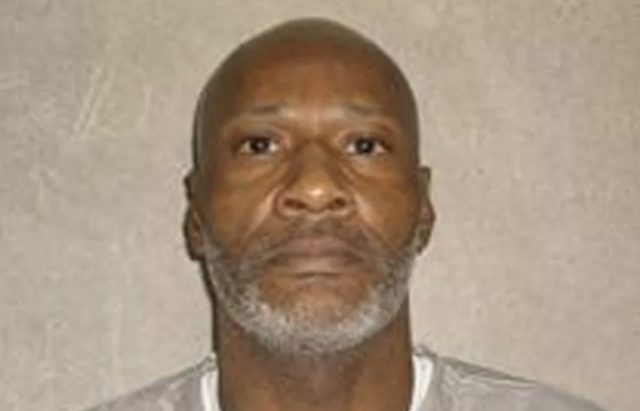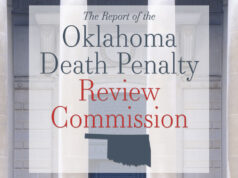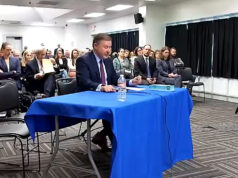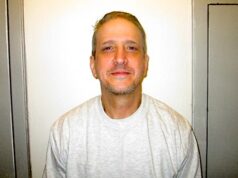
The Oklahoma Pardon and Parole Board voted 3-2 today to deny clemency to John Grant, who is scheduled to be executed on Oct. 28. He will be the first person executed in the state since 2015.
Grant was convicted for the November 1998 murder of prison worker Gay Carter at the Dick Conner Correctional Facility in Hominy while serving sentences for four armed robberies. Grant’s attorneys pleaded Tuesday not for innocence but for mercy, arguing that childhood trauma, neglect and psychological vulnerability should be taken into account.
Voting against clemency were Larry Morris, Scott Williams and Richard Smothermon. In favor of clemency were Adam Luck and Kelly Doyle.
“To look at this case in a very narrow lens, it’s not difficult to see that John Grant stands as a convicted felon who committed an awful crime against an innocent woman,” Morris said at the hearing. “There is no doubt in my mind he serves the criteria for someone who should be on death row and should receive that penalty. However, that will also be balanced with many mitigating factors.”
Grant is scheduled to be the first person executed in Oklahoma since two botched executions, in which Clayton Lockett suffered a slow and painful death and a chemical not included in the state protocol was mistakenly used to execute Charles Warner.
Grant was initially scheduled to be executed in 2014 but had his execution delayed as Oklahoma halted executions to review its lethal injection protocol. Grant’s execution is set to be carried out with the same combination of drugs used before the moratorium, but the state has instituted new protocols.
“The additions that we’ve made to the protocol simply add more checks and balances, more safeguards to the system, to ensure that what has happened in the past won’t happen again,” former Attorney General Mike Hunter said in February.
Prosecution: ‘We need to put this person to death’
During Tuesday’s hearing, defense attorneys and a prosecutor were each given 40 minutes for presentation to the board, with the option to reserve some time for rebuttal at the end. Pam Carter, Gay Carter’s daughter, was also allotted 20 minutes to speak.
Grant’s defense emphasized that Grant had a traumatic past, marked by abuse and neglect. They argued the factors were not taken into account in his initial trial.
“He was a troubled child,” Grant’s lawyer, Sarah Jernigan, said.
She added that Grant has changed during his time in prison.
“If you look at John Grant now, he is not a violent person,” she said. “He has been free of any kind of write-up in 12 years.”
Grant elected not to appear in front of the board himself.
The prosecution argued that the information about Grant’s upbringing was not included in the initial trial because a judge had found it unreliable.
Jennifer Craft, a prosecutor from the Oklahoma Attorney General’s Office, argued that Grant’s childhood was not a sufficient defense, citing that none of his eight siblings had committed similar crimes.
“We need to put this person to death,” Craft said. “We cannot guarantee the safety of other people even if they’re in a controlled environment.”
Pam Carter, who was working in the records department at the same prison on the day of her mother’s murder, used her time to describe her mom as friendly, personable and outgoing.
“She was just very gracious,” Pam Carter said.
Attorney General John O’Connor released a statement Tuesday afternoon.
“Mr. Grant received a jury trial and, in 2000, received the sentence of death. This was a just and appropriate sentence for the brutal murder of Gay Carter,” O’Connor said. “This conviction and sentence was affirmed after years of thorough review by the appellate courts. I am grateful that the board denied Mr. Grant’s request for executive clemency. My thoughts and prayers are with the family of Gay Carter.”
Subsequent clemency hearings, execution dates
Now that the state of Oklahoma has resumed executions, O’Connor has scheduled six others to take place in the coming months:
- Julius Jones, execution scheduled for Nov. 18, 2021. Clemency hearing on Oct. 26, 2021;
- Bigler Stouffer, execution scheduled for Dec. 9, 2021. Clemency hearing on Oct. 27, 2021;
- Wade Lay, execution scheduled for Jan. 6, 2022. Clemency hearing on Nov. 17, 2021;
- Donald Grant, execution scheduled for Jan. 27, 2022. Clemency hearing on Nov. 30, 2021;
- Gilbert Postell, execution scheduled for Feb. 17, 2022. Clemency hearing on Dec. 1, 2021;
- James Coddington, execution scheduled for March 10, 2022. Clemency hearing on Jan. 19, 2022.





















